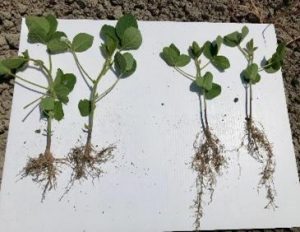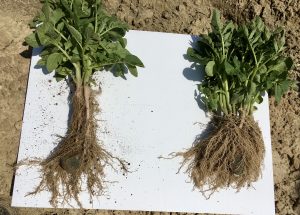Submitted by: Cameron Ford, on behalf of Northeastern Ontario Regional SCIA
Over the past three years the Northeastern Ontario Soil and Crop Improvement Association, in partnership with the West Nipissing/East Sudbury and West Sudbury SCIAs, and the Northern Ontario Farm Innovation Alliance, have conducted a Tier Two project to test the effects of Premier Tech’s AGTIV mycorrhizal inoculant on potato, soybean, and oat crops in the West Nipissing and Sudbury regions.
Mycorrhizae are a type of fungi that are found naturally in soils that form mutually beneficial networks with the roots of plants. As these fungal networks expand, they allow the plant to access minerals, nutrients and water that, through its roots alone, it would not be able to reach. This relationship between plant and fungi stimulates root development and overall plant growth, resulting in healthier and more vigorous plants and therefore greater production and disease resistance.
In addition to plant health, mycorrhizae improve soil structure, increase soil organic matter, and play a positive role in soil aggregation. Soil disturbances, especially frequent deep tilling, break up these fungal networks and reduce their positive effects.
Premier Tech offers the AGTIV line of biologically active treatments, which, through an inoculant applied at the time of planting, is intended to repopulate and re-establish mycorrhizal networks. The AGTIV line includes treatments optimized for different crops. This product line is of interest to farmers in Northern Ontario, and as such, was selected as the mycorrhizal inoculant product to be used in this project.

July 9, 2019 – a comparison of the root development of inoculated soybeans (right) versus non-inoculated (left)
Over the course of the trials, from 2018 to 2021, all crops showed increased yields which correlated with the application of the mycorrhizal inoculant. Inoculated soybeans showed an average increase of 0.825 bushels per acre over non-inoculated soybeans. Inoculated oats showed an average increased yield of 0.92 bushels per acre over non-inoculated oats. Potato yields were harder to quantify due to the combination of qualitative and quantitative data. In 2019, due to a mechanical issue, exact yield measurements could not be recorded, and farmers instead reported an estimated 15% increase in yield in inoculated potatoes over non-inoculated potatoes. Yield sampling, however, showed a more modest increase of 0.6% in inoculated over non- inoculated potatoes.

A comparison of the root development of inoculated potatoes (right) versus non-inoculated (left)
In addition to yield, tissue samples of all crops were collected and analyzed. These analyses showed that inoculated plant tissue regularly had significantly higher concentrations of important nutrients and minerals when compared to non-inoculated plant tissues, and only rarely had significantly lower concentrations. This suggests that the mycorrhizal inoculant does allow plants to become more healthy and vigorous.
In summary, the results of this project suggest that the mycorrhizal inoculant application correlates with improved plant health and yield.
A complete report of the project will be made available in the coming months on FarmNorth.com and nofia-agri.com. A factsheet will also be made available in winter 2021. Currently, further study of biostimulants and mycorrhizal inoculants is being explored in partnership with Algoma University and the University of Guelph. This potential study will build on the findings from this project and will further explore the viability and application of these products in northern climates.